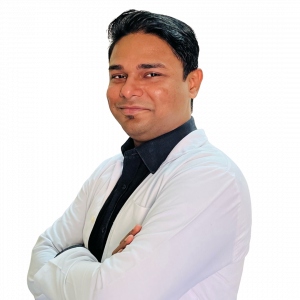- Home
Cancer is a devastating condition that takes a toll on an entire family, leaving a lasting mark on their lives. Characterized by the body’s own cells turning against it through abnormal cell division, this disease disrupts the harmonious functioning of vital tissues and organs.
Its unpredictability is truly unsettling, as it strikes even those who lead healthy lifestyles. In the face of such uncertainty, how do we confront a condition notorious for its enigmatic nature?
In the realm of battling cancer, the words “early detection saves lives” resonate powerfully.
This mantra, vehemently embraced and endorsed by medical experts worldwide, holds the key to transformative outcomes. The question that keeps coming up is how can we ensure early detection of cancer, thus gaining the upper hand in this relentless battle?
In pursuit of this knowledge, we turn to the expertise of Dr. Ravi Shankar – a surgical oncologist whose passion for combating cancer shines brightly. Dr. Shankar’s invaluable insights are generously shared with the CancerMitr team, illuminating a path of hope for everyone.
Why is early detection important? Which all stages are usually referred to as the early cancer stage?
Cancer is a condition characterized by abnormal cell division, which can penetrate various tissues and organs. Depending on the tumour’s size and location, cancer is classified into four stages.
Stages 1 and 2 are often referred to as the early stages, offering a glimmer of hope and the possibility of effective intervention. During these initial phases, the tumour is localized. It has not invaded the nearby tissues, lymph nodes, blood vessels, or organs. This is the time when targeted measures can be taken to either destroy the tumour outright or surgically remove the affected portion, mitigating the risk of further spreading.
As the journey progresses into later stages, the tumour assumes a more significant presence, potentially affecting nearby structures or spreading distant sites (process known as metastasis). Navigating this phase demands an expensive, time-consuming, and comprehensive approach as treatment frequency increases. At the same time, the patient faces more complexities and damages caused by the tumour.
Amidst the challenges posed by cancer, understanding the stages empowers individuals and families to make informed decisions. By fostering awareness and knowledge, people can support one another in the face of both uncertainty and adversity.
What is the current prevalence of cancer in India? Is the number low or high when compared to earlier?
In my expertise, oral cancer is the most prevalent, along with lung, breast and colorectal cancers. However, it’s important to note that these numbers can vary depending on the region. Currently, India is grappling with a substantial burden of Head and Neck cancer.
Undoubtedly, we are witnessing a rise in cancer cases compared to earlier times, but let’s explore the two crucial aspects contributing to this trend: incidence and diagnosis.
When it comes to the incidence, several factors play a role, including lifestyle habits like smoking, tobacco chewing, and more, along with environmental factors like air pollution. Acknowledging and addressing these contributors is paramount in our efforts to combat the disease.
On a positive note, the increase in the number of cancer diagnoses indicates an encouraging shift. More people are becoming aware of the importance of early detection and willingly seeking tests for the disease. This proactive approach significantly impacts prognosis, as early identification paves the way for better outcomes.
We should embrace the power of awareness and knowledge. By understanding the causes, fostering healthy habits, and prioritizing regular screenings, we can collectively shape a brighter future in the fight against cancer.
In your experience, at what stage do patients usually come to you? Do you come across more patients who experience initial symptoms but don’t talk about it until the cancer worsens?
Unfortunately, 60-70% of the patients who come to me are in their advanced stage of cancer. Many of these individuals have experienced symptoms such as persistent ulcers, sore throats, or unusual pain, which often go unnoticed or are mistakenly treated for something else, due to a lack of awareness.
Regrettably, even misdiagnoses can occur, prolonging the time it takes to initiate proper investigations, ultimately leading to later-stage diagnoses.
The importance of awareness cannot be overstated, as it empowers patients to recognize potential warning signs and seek timely medical attention. In that way, the patient will know where to go for timely intervention.
On a more positive note, there are patients who demonstrate admirable awareness about their health. They recognize that certain symptoms might indicate something abnormal and warrant immediate investigation. Their proactive approach to seeking appropriate care can lead to earlier detection and better treatment outcomes.
We are trying to instil the mantra “early detection saves lives” into people’s minds by highlighting it’s importance. So, based on your expertise, how do you compare the prognosis of stage I and stage 4 cancer patients?
When it comes to cancer stages, understanding the risk of recurrence is vital. The focus of treatment revolves around preventing recurrence. By using a combination of therapies, post-surgery chemotherapy or radiation, doctors aim to target any remaining cancerous cells in the bloodstream.
When it comes to stage I patients – 80 out of 100 individuals do not experience a relapse. It is because early-stage tumours are localized and haven’t spread.
However, the scenario changes for stage III or IV patients. Here, 80-90% of individuals may experience a relapse, as the initial treatment didn’t completely eliminate all cancerous cells. If even a small number of cancerous cells, 100 out of 1 lakh, for example, survive treatment, they can trigger a resurgence of the disease.
One thing almost all of my patients ask me is if I can guarantee that the cancer won’t come back after treatment. My honest answer is no; such guarantees are beyond my reach. Each patient’s journey is unique, and predicting individual outcomes is not possible. What I can assure them, though, is my unwavering commitment to providing the finest treatment and tailored protocols customized to their abilities and convenience.
The unpredictable nature of cancer becomes evident as we witness stage I patients who, despite early detection, may face challenging outcomes. Conversely, some stage IV patients defy the odds, surpassing five-year survival milestones.
That’s the nature of this disease, unpredictability.
As a healthcare provider, my mission is to advocate for early detection, as research and my own experience indicate that it offers the best chance for survival.
Recent news published in the Times of India has revealed that the minimum out-of-pocket expenditure for cancer treatment is 3.3 lakhs. What kind of financial challenges do cancer patients face?
Let me paint a hypothetical picture. A patient requires a combination of surgery and chemotherapy to overcome the disease. The treatment process spans at least three months, followed by a recovery phase lasting another 2-3 months. Throughout this period, the patient must adhere to medications to manage side effects and make lifestyle adjustments to optimize treatment’s effectiveness.
During these challenging months, the patient may find it difficult, if not impossible, to work due to the recommended bed rest and the toll of side effects. Consequently, their income source takes a hit, impacting their financial stability.
Caregivers, equally invested in the patient’s well-being, invest their time, money, and energy in providing support.
In the realm of cancer treatment, quality is non-negotiable. We prioritize the best protocols to achieve optimal results for our patients. As a consequence, out-of-pocket expenses alone can amount to a significant sum, often ranging from 3 to 5 lakhs.
But in later stages, the cancer treatment expenses can amount to 15-20 lakhs.
By catching the disease early on, treatment options become more manageable and less resource-intensive.
Corporate life usually sees habits like prolonged sitting, excess caffeine or junk food, lack of exercise and improper sleep. What cancers are linked to these habits?
There isn’t clear scientific evidence directly linking improper sleep or prolonged sitting to cancer, it’s essential to understand how these habits can impact overall health.
They can contribute to health issues such as obesity, diabetes, hypertension, stress, and high cholesterol – weakening the body’s ability to defend itself against various illnesses, including cancer.
In our fast-paced world, many corporates and institutions see a culture of long work hours, inadequate sleep, limited physical activity, and poor nutrition. These habits, when ingrained over time, can lead to significant health complications. Non-communicable diseases become persistent, taking a toll on one’s physical, mental, and social well-being.
It’s crucial to remember the age-old adage, “everything in excess is poison” – be it strength, wealth, or even certain habits. While we don’t want to create fear around enjoying life, moderation is the key to maintaining a healthy balance. Habits that compromise health, when indulged in excessively, can contribute to various conditions, including cancer.
Why is cancer awareness important in corporates and institutions? How can corporates play a role in cancer screening?
Corporates hold a pivotal role in shaping a culture of wellness among their employees. Peer pressure plays an important role in people picking up unhealthy habits like tobacco chewing, excess alcohol, junk food, lack of nutrition, and smoking in their teen years.
However, corporates and institutions have the power to create a platform that fosters the opposite – a culture that champions regular exercise, wholesome diets, and routine health screenings. After all, these organizations consist of grown-up individuals, responsible adults who can become powerful agents of change. By passing on vital knowledge, they can positively influence an entire generation.
One inspiring trend I’ve observed is the dedication of certain individuals to prioritize not just their own well-being, but that of their entire family. Through routine health screenings, including cancer screenings, they proactively detect potential issues even before symptoms manifest.
Finding the right balance in daily life is paramount. Ensuring sufficient nutrients through a well-rounded diet and dedicating at least 15 minutes to physical exercise can work wonders for our health. Striking this equilibrium allows us to safeguard our well-being while still indulging in occasional treats.
It is heartening to witness a change in mindset and culture, and this fills me with hope for the future. As we progress, future generations may surpass us in spreading awareness and eradicating the stigma against healthcare.
Take a stand for your health.
Book your CancerMitr Smart Card to unlock a world of comprehensive resources such as;
- Personalized preventive lifestyle plans
- Dedicated guides throughout their health journey
- Expedited access to breakthrough treatments
- Top-notch providers and specialists at their fingertips
- Additional perks for valued team members
- Holistic approach to address physical, emotional, and mental well-being
- Enhanced quality of life, minimizing discomfort
- A supportive network of like-minded individuals
- Cost savings for the organization and employees
- Streamlined path to timely, effective care
To book your CancerMitr Smart Card Click Here

Dr Ravi Shankar
Head & Neck Surgeon
● M.Ch (Head & Neck Oncology)
● MBBS
● MS (ENT)
● DNB
Dr. Ravi Shankar (M.S, D.N.B, M.Ch) specialises in Head and Neck Oncosurgery with over a decade long experience in medical field. This illustrious journey led him to thrive as an Associate Professor at Tata Memorial Centre, Varanasi, and later, as an Assistant Professor at Tata Memorial Hospital, Mumbai. His quest for excellence commenced at the prestigious Maulana Azad Medical College, N.Delhi, where he pursued and mastered MBBS and MS, focussing on M. Ch (Head and Neck Surgery).
His expertise encompasses a tapestry of conditions, including Oral cancer, Thyroid cancer, Larynx cancer, Ear Cancer, Nose and Paranasal Sinus Cancer, Throat Cancer, Tongue cancer, Jaw cancer, and Skull base cancer. Others skills include cutting-edge techniques such as Endoscopic surgery, Microlaryngeal Laser Surgery, Parathyroid Surgery, and Parapharyngeal Tumours.
With a passion for healing and a heart imbued with compassion, Dr. Ravi Shankar stands as a beacon of hope, touching lives with his surgical finesse and dedication to the noble pursuit of improving the well-being of those he serves.

